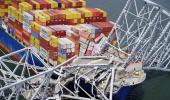'Indians are basically liked because they are educated, they are intelligent.'

Captain Peter Jhanjee, who hails from Mumbai, spent 25 years at sea, before he moved to a land job.
He has steered hundreds of freighters into port; cargo ships as large and unwieldy as the MV Dali, which crashed into the Francis Scott Key Bridge in Baltimore in the last week of March.
The former master, with only loads of empathy in his heart for the captain of Dali, knows exactly how tough it is to negotiate harbours with bridges (most older harbours have them) and how sometimes several unpredicted and bewildering circumstances can sadly, fatefully conspire together to bring on a disaster. "It was like a perfect storm," the master mariner explains to Vaihayasi Pande Daniel/Rediff.com.
A similar disaster was averted not even two weeks later when the container ship APL Qingdao lost power in New York harbour, quite close to the landmark Verrazano Narrows Bridge.
Captain Jhanjee, who now works as vice president operations and strategic growth, for a US technology solutions company, dissects what might have happened -- based on his considerable seafarer expertise -- in Baltimore harbour on March 26.

Do a lot of cargo ships have Indian crews these days? I read that about 66 per cent of unlicensed crew members are Asian and 49 per cent officers are Asian.
Was it expected that the crew would either be Indian or Filipino or Chinese, because the third highest nationality in shipping is Indian and therefore that was no coincidence? Are Indian crews generally well trained? When you heard that the crew was Indian did any thoughts come to mind?
Indian crews are very good. Their training is very extensive. I do not fault that in any way.
Secondly, Indians are normally pretty well educated, and now modern ships require people with better education. It's not like the really old days, where riff-raff was thrown onto the ships.
What we do have is highly-trained, educated people going on board, especially among officers. Even our crew has to go through training before they go on board. By all crew, I mean deckhands and people who work in engine rooms, fitters, for example. They all have certificates.
Indians are basically liked because they are educated, they are intelligent.
Thirdly, finally, they are comparatively more economical than their western counterparts. Everything, finally, is (about money) -- Indian seafarers are educated, smart and cheaper than their European counterparts.
They have tried other nationalities. They've tried Filipinos, they've tried others -- they are also effective. Among 'more cost- effective' crew members, I think, the Indians stand out.

So therefore, it was no coincidence that the crew was Indian, because there are a huge number of Indians in this profession?
So, yes that is no coincidence, I mean I was one of them. I worked for different foreign companies and I was also Indian. It is a general trend. Most of my batch mates are all on foreign ships.
In India, the merchant navy is considered a good and sought after profession. The training is good, the salary is very competitive for the Indian market and can easily raise the standard of living for those who are employed in the profession. Because of its popularity, several training institutes have opened in several cities in the country.

 IMAGE: Captain Peter Jhanjee. Photograph: Kind courtesy Captain Peter Jhanjee
IMAGE: Captain Peter Jhanjee. Photograph: Kind courtesy Captain Peter JhanjeeSo, even more sympathy for an Indian crew too?
Absolutely. (This collision) was like a perfect storm -- all the conditions were right for a disaster. Because as soon as it happened, the master really did not have time to stop the ship from moving forward.
Or stop its momentum. And once you lose steering and propulsion on a ship, you are in the hands of God.
The captain and crew, they dropped the anchor. But a ship that is moving at eight knots, you can't really stop it. It's a 100,000 tonne ship. Can you imagine the momentum of it moving, dragging an anchor along with it?
Trying to stop it is literally trying to use a pin to stop an avalanche. It was not going to happen. And the captain didn't have the time. There was no time. Nobody had the time to take the necessary actions.
This ship crash has caught everyone's imagination because of the slow-motion manner in which such a large, famous and expensive bridge collapsed? And also maybe because of the international nature of the incident -- Indian crew, Singapore flag, South Korean built, Baltimore harbour? Or is there some other reason why it is so newsworthy in your view?
It is a disaster. Everything is sensationalised just now. But again, it was one of the largest bridges over the entrance to one of the biggest ports on the east coast of America. It's not that the other ports don't exist. There's Delaware and other ports nearby. But it was a hub for, for Maryland, for Baltimore.
Not only that, around 32,000 people travel across that bridge on a daily basis. It's a shortcut for getting to where they have to go. They now have to go around and there's a lot of inconvenience.
Again, I think a lot got sensationalised because it happened in the United States. For some reason, or the other, people feel that anything that happens negative in the United States becomes the biggest news in the world.
Feature Presentation: Ashish Narsale/Rediff.com











 © 2025
© 2025